Filter by
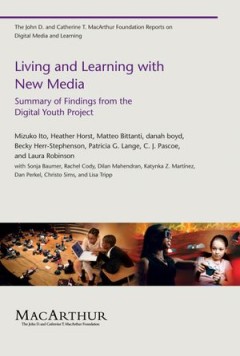
Living and Learning with New Media : Summary of Findings from the Digital You…
This report summarizes the results of an ambitious three-year ethnographic study, funded by the John D. and Catherine T. MacArthur Foundation, into how young people are living and learning with new media in varied settings—at home, in after school programs, and in online spaces. It offers a condensed version of a longer treatment provided in the book Hanging Out, Messing Around, and Geeking O…
- Edition
- -
- ISBN/ISSN
- 9780262513654
- Collation
- 128 halaman
- Series Title
- -
- Call Number
- 302 ITO l
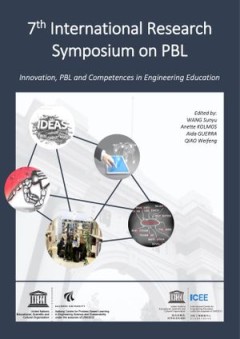
Innovation, PBL and Competences in Engineering Education : 7th International …
Today’s students will perform in a technology-based society and contribute to a global economy. Technologies, like automation, Internet of Things (IoT), artificial intelligence (AI), come with promise of transforming deeply the work places and creating new business models. In addition, the sustainability crises is threatening the future of planet earth and human society. These trends posed ne…
- Edition
- -
- ISBN/ISSN
- 9788772100029
- Collation
- -
- Series Title
- -
- Call Number
- 370 INN
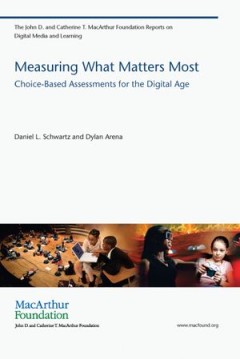
Measuring What Matters Most : Choice-Based Assessments for the Digital Age
An argument that choice-based, process-oriented educational assessments are more effective than static assessments of fact retrieval. If a fundamental goal of education is to prepare students to act independently in the world—in other words, to make good choices—an ideal educational assessment would measure how well we are preparing students to do so. Current assessments, however, focus alm…
- Edition
- -
- ISBN/ISSN
- 9780262518376
- Collation
- 192 halaman
- Series Title
- -
- Call Number
- 370 SCH m

Persuasive Technology: 10th International Conference, PERSUASIVE 2015, Chicag…
This book constitutes the refereed proceedings of the 10th International Conference on Persuasive Technology, PERSUASIVE 2015, held in Chicago, IL, USA in June 2015. The 19 revised full papers and 5 revised short papers presented were carefully reviewed and selected from 41 submissions. The papers are grouped in topical sections on understanding individuals, empowering individuals and understan…
- Edition
- 1
- ISBN/ISSN
- 978-3-319-20306-5
- Collation
- XIII, 265
- Series Title
- Lecture Notes in Computer Science
- Call Number
- 153.852 MAC p
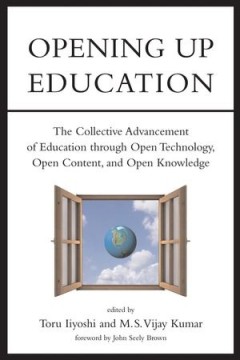
Opening Up Education : The Collective Advancement of Education through Open T…
Experts discuss the potential for open education tools, resources, and knowledge to transform the economics and ecology of education. Given the abundance of open education initiatives that aim to make educational assets freely available online, the time seems ripe to explore the potential of open education to transform the economics and ecology of education. Despite the diversity of tools and r…
- Edition
- -
- ISBN/ISSN
- 9780262033718
- Collation
- 500 halaman
- Series Title
- -
- Call Number
- 370 OPE

Cooperative vehicular communications in the drive-thru internet
This brief presents a unified analytical framework for the evaluation of drive-thru Internet performance and accordingly proposes an optimal spatial access control management approach. A comprehensive overview and in-depth discussion of the research literature is included. It summarizes the main concepts and methods, and highlights future research directions. The brief also introduces a novel c…
- Edition
- 1
- ISBN/ISSN
- 9783319204543
- Collation
- IX, 75
- Series Title
- SpringerBriefs in Electrical and Computer Engineering
- Call Number
- 621.39
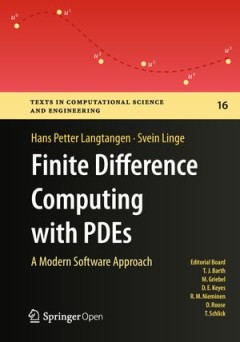
Finite Difference Computing With PDEs: A Modern Software Approach
This easy-to-read book introduces the basics of solving partial differential equations by means of finite difference methods. Unlike many of the traditional academic works on the topic, this book was written for practitioners. Accordingly, it especially addresses: the construction of finite difference schemes, formulation and implementation of algorithms, verification of implementations, analys…
- Edition
- 1
- ISBN/ISSN
- 9783319554556
- Collation
- XXIII, 507
- Series Title
- Texts in Computational Science and Engineering
- Call Number
- 620 LAN f
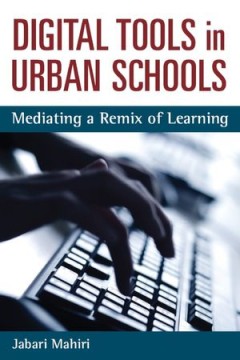
Digital Tools in Urban Schools : Mediating a Remix of Learning
The digital age and the age of hip-hop emerged collaterally during the last 35 years. Increasingly, young people in the United States and globally use screen-based, digital technologies to source and transmit words, images, video, and sounds as they engage in meaning making, identity connections, and social networking. They come to school with experiences, interests, affinities, and skills uniq…
- Edition
- -
- ISBN/ISSN
- 9780472900305
- Collation
- 170 halaman
- Series Title
- -
- Call Number
- 370 MAH d
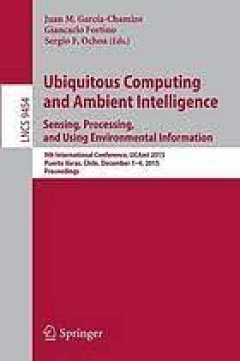
Ubiquitous Computing and Ambient Intelligence. Sensing, Processing, and Using…
This book constitutes the refereed proceedings of the 9th International Conference on Ubiquitous Computing and Ambient Intelligence, UCAmI 2015, held in Puerto Varas, Chile, in December 2015. The 36 full papers presented together with 11 short papers were carefully reviewed and selected from 62 submissions. The papers are grouped in topical sections on adding intelligence for environment adapt…
- Edition
- -
- ISBN/ISSN
- 978-3-319-26401-1
- Collation
- -
- Series Title
- -
- Call Number
- -
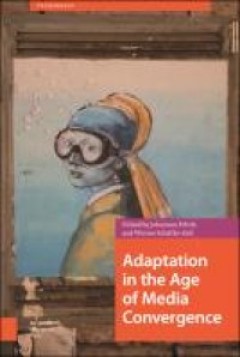
Adaptation in the Age of Media Convergence
This collection considers new phenomena emerging in a convergence environment from the perspective of adaptation studies. The contributions take the most prominent methods within the field to offer reconsiderations of theoretical concepts and practices in participatory culture, transmedia franchises, and new media adaptations. The authors discuss phenomena ranging from mash-ups of novels and Yo…
- Edition
- -
- ISBN/ISSN
- 9789462983663
- Collation
- 224 halaman
- Series Title
- -
- Call Number
- 302 FEH a
 Computer Science, Information & General Works
Computer Science, Information & General Works  Philosophy & Psychology
Philosophy & Psychology  Religion
Religion  Social Sciences
Social Sciences  Language
Language  Pure Science
Pure Science  Applied Sciences
Applied Sciences  Art & Recreation
Art & Recreation  Literature
Literature  History & Geography
History & Geography